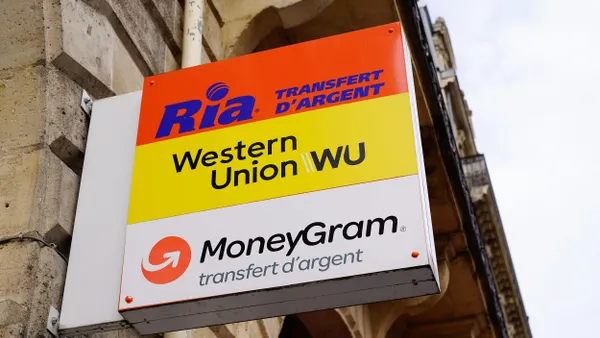Dive Brief:
- The Federal Trade Commission sued Seattle-based bill-pay firm Doxo, alleging the company and two of its co-founders, Steve Shivers and Roger Parks, engaged in deceptive business practices to mislead consumers about the junk fees they charged to customers, the regulatory agency said Thursday.
- In its complaint, the FTC alleged that Doxo placed misleading ads “to intercept consumers attempting to reach their billers directly,” and used ads and weblinks to feature “only the biller’s name, not Doxo’s—so that they appear to be the biller’s own page.”
- By doing so, the company has allegedly collected “millions of dollars in junk fees” from consumers paying bills such as child support, utility bills, medical expenses and other categories, the FTC said in its April 25 complaint. Such fees could be avoided if the customers had paid their biller directly, the agency said. Doxo refuted the allegations in a Friday statement.
Dive Insight:
In the FTC’s complaint, the agency alleged that Doxo’s behavior violated the FTC Act, the Restore Online Shoppers’ Confidence Act and the Gramm-Leach-Billey Act. Its commission voted unanimously to file the complaint, which it later filed in the U.S. District Court for the Western District of Washington.
“Doxo intercepted consumers trying to reach their billers and tricked them into paying millions of dollars in junk fees,” Samuel Levine, director of the FTC’s Bureau of Consumer Protection, said in the statement. “The FTC will continue to take action when companies use deceptive design tricks to harm consumers.”
In response to the FTC’s complaint, Doxo countered the allegations, explaining that the agency does not understand the company’s services, per the Friday press release. The FTC’s lawsuit disregards the company’s efforts to meet and exceed regulatory requirements, Doxo’s legal counsel, Courtland Reichman, who is with the law firm Reichman Jorgensen Lehman & Feldberg LLP, said in the statement.
“This is a misguided action by the FTC that fails to understand the current bill-pay market structure, the payment networks and processes used in this market, and Doxo’s business practices,” Shivers said in the statement. “We look forward to fighting this battle on behalf of consumers and billers and continuing to bring innovation and transparency to this market.”
In its lawsuit, the FTC included consumer complaints regarding Doxo’s practices, indicating that customers only realized that they weren’t paying their billers directly after the fact. The agency noted that billers have previously demanded the company stop using their company’s name and logo to collect payments on their behalf or “otherwise remove the deceptive elements of Doxo’s website and payment process.”
“I didn’t even know that I was actually dealing with a third-party bill pay system when the hospital doesn’t even charge you to make a payment online,” read one consumer complaint.
“I was completely unaware I was using Doxo,” another consumer wrote. “They sleazily set it up some way, I don’t know how, so you think you are paying directly.”
Despite requests from companies to cease the practice and complaints from customers, the agency said in its complaint that the company continued to engage in the deception. The FTC quoted a Doxo employee who said: “We hear complaints from [billers] fairly often on the support side, and it doesn’t change anything. We don’t remove them/stop using their name.”












